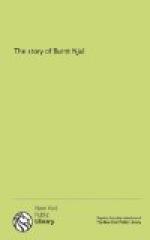“Then we will not break it,” says Skarphedinn, “but if anything arises between us, then we will bear in mind the old feud.”
“Then I will ask you to spare no one,” says Njal.
CHAPTER XLIV.
SIGMUND MOCKS NJAL AND HIS SONS.
Now men ride home from the Thing; and when Gunnar came home, he said to Sigmund—
“Thou art a more unlucky man than I thought, and turnest thy good gifts to thine own ill. But still I have made peace for thee with Njal and his sons; and now, take care that thou dost not let another fly come into thy mouth. Thou art not at all after my mind, thou goest about with jibes and jeers, with scorn and mocking; but that is not my turn of mind. That is why thou gettest on so well with Hallgerda, because ye two have your minds more alike.”
Gunnar scolded him a long time, and he answered him well, and said he would follow his counsel more for the time to come than he had followed it hitherto. Gunnar told him then they might get on together. Gunnar and Njal kept up their friendship though the rest of their people saw little of one another. It happened once that some gangrel women came to Lithend from Bergthorsknoll; they were great gossips and rather spiteful tongued. Hallgerda had a bower, and sate often in it, and there sate with her daughter Thorgerda, and there too were Thrain and Sigmund, and a crowd of women. Gunnar was not there nor Kolskegg. These gangrel women went into the bower, and Hallgerda greeted them, and made room for them; then she asked them for news, but they said they had none to tell. Hallgerda asked where they had been over night; they said at Bergthorsknoll.
“What was Njal doing?” she says.
“He was hard at work sitting still,” they said.
“What were Njal’s sons doing?” she says; “they think themselves men at any rate.”
“Tall men they are in growth,” they say, “but as yet they are all untried; Skarphedinn whetted an axe, Grim fitted a spearhead to the shaft, Helgi rivetted a hilt on a sword, Hauskuld strengthened the handle of a shield.”
“They must be bent on some great deed,” says Hallgerda.
“We do not know that,” they say.
“What were Njal’s house-carles doing?” she asks.
“We don’t know what some of them were doing, but one was carting dung up the hill-side.”
“What good was there in doing that?” she asks.
“He said it made the swathe better there than any where else,” they reply. “Witless now is Njal,” says Hallgerda, “though he knows how to give counsel on every thing.”
“How so?” they ask.
“I will only bring forward what is true to prove it,” says she; “why doesn’t he make them cart dung over his beard that he may be like other men? Let us call him ‘the beardless carle’: but his sons we will call ‘dung-beardlings’; and now do pray give some stave about them, Sigmund, and let us get some good by thy gift of song.”




